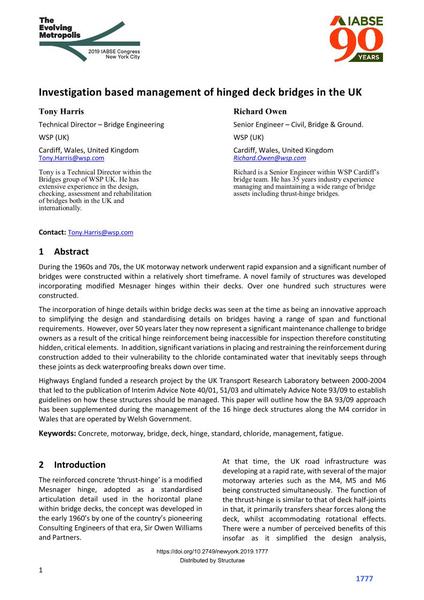Investigation based management of hinged deck bridges in the UK

|
|
|||||||||||
Détails bibliographiques
| Auteur(s): |
Tony Harris
(WSP (UK))
Richard Owen (WSP (UK)) |
||||
|---|---|---|---|---|---|
| Médium: | papier de conférence | ||||
| Langue(s): | anglais | ||||
| Conférence: | IABSE Congress: The Evolving Metropolis, New York, NY, USA, 4-6 September 2019 | ||||
| Publié dans: | The Evolving Metropolis | ||||
|
|||||
| Page(s): | 1777-1782 | ||||
| Nombre total de pages (du PDF): | 6 | ||||
| DOI: | 10.2749/newyork.2019.1777 | ||||
| Abstrait: |
During the 1960s and 70s, the UK motorway network underwent rapid expansion and a significant number of bridges were constructed within a relatively short timeframe. A novel family of structures was developed incorporating modified Mesnager hinges within their decks. Over one hundred such structures were constructed. The incorporation of hinge details within bridge decks was seen at the time as being an innovative approach to simplifying the design and standardising details on bridges having a range of span and functional requirements. However, over 50 years later they now represent a significant maintenance challenge to bridge owners as a result of the critical hinge reinforcement being inaccessible for inspection therefore constituting hidden, critical elements. In addition, significant variations in placing and restraining the reinforcement during construction added to their vulnerability to the chloride contaminated water that inevitably seeps through these joints as deck waterproofing breaks down over time. Highways England funded a research project by the UK Transport Research Laboratory between 2000-2004 that led to the publication of Interim Advice Note 40/01, 51/03 and ultimately Advice Note 93/09 to establish guidelines on how these structures should be managed. This paper will outline how the BA 93/09 approach has been supplemented during the management of the 16 hinge deck structures along the M4 corridor in Wales that are operated by Welsh Government. |
||||
| Mots-clé: |
béton pont tablier
|
||||
